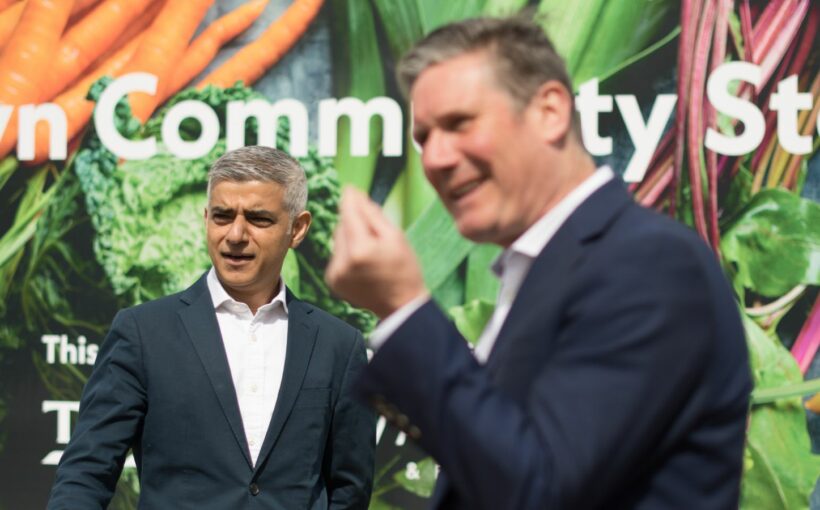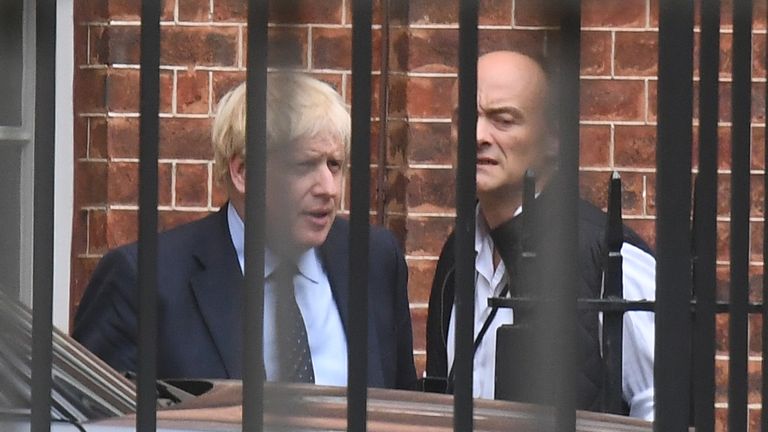The government spent taxpayers’ money on opinion polling of senior Labour figures at the beginning of the COVID crisis, according to newly-released documents.
A Cabinet Office contract with Hanbury Strategy worth £580,000 and struck in March last year is currently subject to a legal challenge after it was awarded without competition.
The contract was for “research into public attitudes & behaviours in relation to COVID-19”.
Hanbury were founded by Paul Stephenson, a Vote Leave ally of Prime Minister Boris Johnson, Cabinet Office minister Michael Gove and Number 10’s then chief adviser Dominic Cummings.
The firm also worked for the Conservative Party during the 2019 general election campaign.
It has now been revealed that, on 20 March last year, Mr Cummings urged a top civil servant to “sign off immediately” on Hanbury’s COVID contract so that “Paul S can get our large scale polls into field TODAY”.
“Anybody in CABOFF whines tell them I ordered it from PM,” Mr Cummings added in the email.
In other documents released by the Good Law Project – who are currently challenging the award of Hanbury’s COVID contract in court – it was revealed that Cabinet Office officials later expressed concerns about the nature of the work being done.
One wrote: “Hanbury measure attitudes towards political figures, which they shouldn’t do using government money, but they’ve been asked to and it’s a battle that I think is hard to fight.”
And another said: “This all makes me really uncomfortable. Ben Warner [a Number 10 adviser and former Vote Leave member] wants us to spend £110k of public money per month with the agency who were behind Vote Leave who have no mainstream polling experience.”
Another document published by the Good Law Project suggests that Hanbury were asking polling questions about London mayor Sadiq Khan and Sir Keir Starmer, who was elected Labour leader in April last year.
Responding to the release of the documents, Labour’s deputy leader Angela Rayner said: “This is a racket, not a government acting in the national interest during a pandemic.
“Taxpayers’ money that has been abused in this way should be paid back by the Conservatives.
“Taxpayers’ money is not the personal cashpoint of Conservative ministers to dish out to their mates.”
But, in a series of Twitter posts, Mr Cummings defended the government’s contract with Hanbury.
He suggested the polling work was to “figure out” which non-government figures were most trusted for public health communications.
“I was thinking re ideas like joint press conferences with Pm/Starmer/Sadiq etc but also other figures who were more persuasive than tory MPs to particular audiences,” he wrote.
“This is *what No10 SHOULD do in a national crisis*, just as Churchill/Attlee cooperated.”
Mr Cummings added he would be “outraged” if Labour had not done the same if they had been in government.
And, defending the choice of Hanbury for the Cabinet Office contract, he said: “Why Hanbury? Just weeks ago they’d worked with me on GE.
“Unlike normal polling companies I *knew* they cd connect *instantly* to new No10 data science team & cloud *with zero mtngs*. INSTANTLY, without mtngs/debate, was what we needed as covid spread.”
A Hanbury spokesperson said their team’s “knowledge of polling and modelling is widely appreciated as being first class”.
“We were asked by the government to step up and provide research and significant amounts of modelling at extremely short notice in order to help with a national crisis,” they added.
“We agreed to do this in the full knowledge that it would probably lead to politically motivated attacks against us and the risks that this would create for our business.
“We did it because we thought we could help save lives and it was therefore a risk worth taking.
“Our work contributed to what was a hugely successful public health communications campaign which undoubtedly prevented many deaths.”
A Cabinet Office spokesperson said: “In response to an unprecedented global pandemic, the government acted with urgency to undertake vital research into public attitudes and behaviours.
“This research shaped crucial public health messages, helping us to protect the NHS and save lives.”
Under government procurement rules, ministers are able to award contracts without a competitive tender in situations of “extreme urgency”.
Source: Read Full Article

